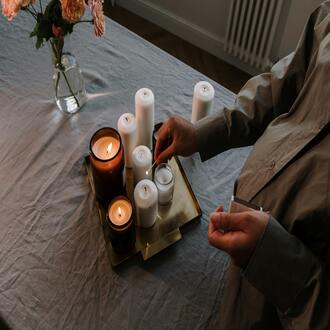Transcription Trust in communication
Do we trust that person we see all day long reflected in the mirror? Or are we afraid of that weak and vulnerable person? If you trust, there will be no impediment to achieve what you set out to do. The arrival of success is indisputably oriented towards those who BELIEVE. In this video we will share the relationship between security and confidence. We will mention and identify some lies that we come to invent as a result of an erroneous perception of reality. Of course, we ask for your full willingness to unravel certain erroneous beliefs that we hold. CONFiA, you can do it.
Self-confidence.
How to possess the famous "self-confidence"? It is very easy to say that we are confident in our work, and at the drop of a hat sabotage what we are doing. To be sure of yourself and of what you give is indispensable if you want to begin to TRUST. The concept you have of who you are helps you to make peace with yourself.
If you think you are unpleasant, and you have the acceptance of close relatives, you will continue to be unpleasant. You will not bother to change. The other side of the coin is when you don't feel comfortable with those "traits", in which case you try to restructure them. Focus on the positive things you have, and understand what specific characteristics detract from your security.
Vulnerability.
One of the main sources of confidence is the feeling of security that you arouse. If you feel secure, you will feel confident. It is a directly proportional relationship.
Let's go deeper into vulnerability. When you feel vulnerable, you are sensitive, fearful and afraid, right? That fear is due to the uncertainty of the unknown. Your brain is either afraid of traumatizing experiences or of unknown situations. Hence the saying: "Better the good known, than the bad unknown". We settle for the predictable, which means avoiding uncertainty and disappointing attitudes.
Identify lies.
It is interesting that fear is sometimes the product of invented ideas, or better said, accepted lies. Don't you believe me? How many times have you perjured yourself: "I'm going to fail, I didn't study enough" and then you passed the exam. Just like that.
Lies become a way of perceiving reality. You tell yourself as soon as you wake up: "I am weak, I have no social skills, I am useless". Of course, your whole life will be directed accordingly. If you are weak, you cannot show strength in difficult situations, it would be incongruous. Moreover, a weak person is afraid of difficult situations, because he believes he will not be able to cope with them. How to identify some of these lies? Analyze the fault: Look for the origin of the conflict in your sentimental or professional relationships. Why don't they have all the quality they need? Identify: Wherever the "failure" is, there are the lies. If you cannot fall asleep whenever you sleep alone, ask yourself about the veracity of that belief.
Ask yourself: Do I feel safe when I sleep in company, and is that feeling of security lost when I sleep alone?
Answer yourself: Did feeling overprotected in the womb play a role? You need human warmth to sleep, is it dependence, attachment or habit. Keep delving into its origin.
Truths.
Now change the content of the lies and start telling TRUTHS that oppose them. At first it will seem silly, you will not believe it and you will even laugh. Repeat to yourself constantly that: "I am a trustworthy person", laugh when you say it, take it as a mockery, but say it. There will come a time when you will believe it because your brain has no sense of humor. No matter what you say, it will always obey the order. It doesn't matter if it is a repetitive thought or a joy that we are "pretending", if you say: "joy", it will understand exactly that: joy.
You are not alone.
We come to another point to consider. You are not the only one who has felt elated, sad, melancholic or helpless. What do I mean by this? Many times, being in a first professional interview or dismayed on a first date, we believe that the only person surrounded in emotions is us. No, emotions come up all the time, whether we want them to or not. You are not the only one who is nervous because you are going to present your term paper. Ah, yes, you may be the only one who is visibly showing it. But can you confirm that the butterflies in your stomach are only yours? Maybe that girl laughing her head off is also super nervous.
Let's keep practicing!
The moments we go through in life are just that, moments. They can mark us for life, but they will be momentary, not always anchored in the present. Example: you have a conversation with your boss at 3:00pm, you think it is to say goodbye. You begin to generate a state of anxiety. The world falls on top of you. The appointed time arrives and let's say that if your prophecy comes true, what will happen in a week's time?
Visualize the situation in the future. It's possible that a week later you'll find a better job. You'll be laughing again in two weeks, a month or a year. Don't live under the shadow of pessimism. You have overcome many obstacles and yet you are still alive.
To think that "your life ends there" is another accepted lie. If we continue to feed ourselves in misfortune, we will come to believe that it does.
Do you know that a simple change of look can make us feel better emotions and confidence? You just need to pamper yourself, take care of yourself and respect yourself. Boost your confidence with external projection. Keep reading, preparing yourself in the subject you don't control. Learn to defy fear, showing yourself more elegant and prepared. Compile all theoretical knowledge on the subject: anguish, helplessness, etc. And then practice over and over again. Keep practicing the challenges you have already started to meet.
As a specific exercise we will eliminate from our vocabulary certain words that help to enhance fear or insecurity. Among them are: "I believe I can, I will try or I will try", all those that designate doubt. Instead we will use: I will be able to or we are going to do it. Whenever you begin to doubt yourself, rejoice and instead bask in the confidence you do not yet possess. Shout with energy: "I can do it. We're going to do it. When they ask for your help, include confidence: "What do you mean, I can't cook? I'll get ready right now and do it.
The impediment, on most occasions, is a state of mind influenced by the lies we devise.
trust communication




